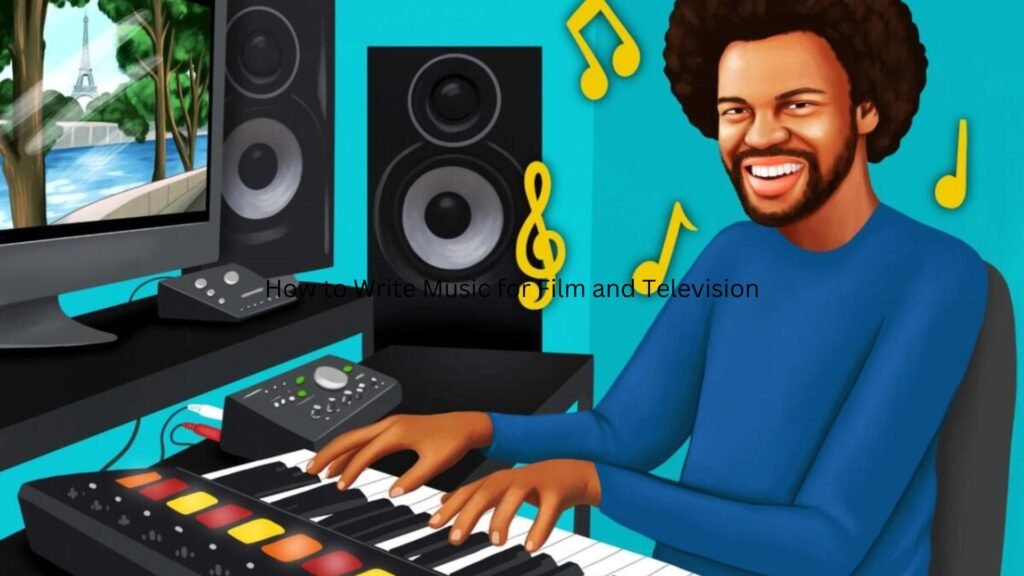Writing music for film and television is a unique and highly creative process that involves blending music with the visual and emotional aspects of storytelling. As a composer, your goal is to enhance the narrative, deepen the audience’s connection with the characters, and heighten the emotional impact of the scene. In this article, we will walk you through the essential steps and tips for writing music for film and television, from understanding the role of a composer to producing the final score.

Understand the Role of a Film Composer
Before diving into composing music, it’s essential to understand the role of a film or TV composer. Your primary responsibility is to create a musical score that complements the film’s narrative. Unlike other types of music, film music works in tandem with the visuals and dialogue. It can enhance the mood, convey emotions, and even help tell a story without words.
Film composers need to be highly adaptable and skilled in creating music that fits different genres, from dramatic and intense moments to lighthearted or comedic scenes. You should also be prepared to work closely with directors, producers, and music supervisors to ensure your music aligns with their vision.
Collaborate with the Director and Other Creatives
Collaboration is key when writing music for film and television. A film score is a product of teamwork, and it’s important to communicate effectively with the director and other members of the creative team. Directors often have specific musical ideas or moods in mind for certain scenes, and it’s your job to translate those ideas into musical compositions.
At the beginning of the process, schedule a meeting with the director to understand the overall tone, themes, and key moments of the film or TV show. Discuss how music can enhance the visuals, whether through subtle background cues or bold, thematic statements. Throughout the project, keep the lines of communication open and ask for feedback regularly to ensure your compositions match the director’s vision.
Analyze the Script and Visuals
Before composing the music, take time to analyze the script, storyboards, or rough cuts of the film or TV show. Understanding the narrative structure and visual style is crucial to composing music that enhances the story.
Look for key moments in the script that could benefit from musical support. For example, intense action scenes may call for a fast-paced, rhythmic score, while emotional or intimate moments might require more subtle, ambient music. Pay attention to visual cues such as lighting, camera angles, and transitions, as these can influence the emotional tone of the music.
Choose the Right Instrumentation
The instrumentation you choose for a film score plays a significant role in shaping its sound and mood. Different instruments convey different emotions, so selecting the right combination is essential to match the film’s tone.
For instance, orchestral instruments like strings and brass can create grandeur and drama, while electronic sounds may be more appropriate for a futuristic or suspenseful scene. Experiment with a variety of instruments to create the perfect sonic palette for your project. You can even blend traditional instruments with modern sound design techniques to create something unique and innovative.
Create Themes and Motifs
One of the most powerful techniques in film music is the use of recurring themes and motifs. These musical elements can represent characters, locations, or specific emotions. By repeating and altering these motifs throughout the score, you can reinforce the narrative and create a deeper connection between the audience and the story.
For example, you might create a distinct musical theme for the protagonist, which reappears in various forms throughout the film. As the character undergoes emotional changes, you can adapt the theme to reflect their development. Similarly, a recurring motif for a villain or important plot element can help maintain thematic consistency.
Conclusion
Writing music for film and television is a rewarding but challenging endeavor that requires creativity, collaboration, and technical skill. By understanding the role of a composer, collaborating with the director, and using techniques like themes and synchronization, you can create music that enhances the storytelling and emotional depth of a film or TV show. Remember to experiment with different styles and instrumentation, and always keep the narrative at the forefront of your composition process. With practice and persistence, you can craft memorable scores that resonate with audiences and elevate the cinematic experience.







